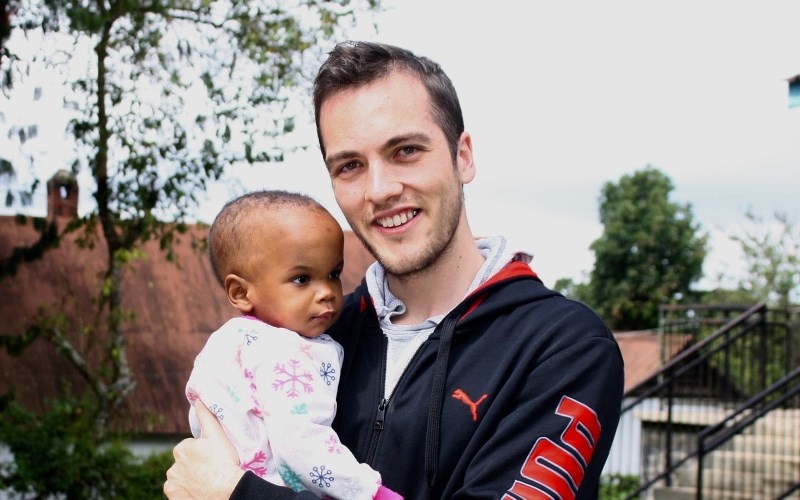by Scott Hayes
Nkoaranga Orphanage in Tanzania is a very special place but not necessarily in the way that you might think.
There are a few dozen children who live at the facility but it's not entirely appropriate to call them all orphans, as many of them still have family members who can be their caregivers. Nkoaranga has a family reunification program that works to help support those family members who want to look after the child but can't manage it just yet.
"Most orphanages or childcare organizations will take the kids but will do nothing to support kids as members of families. We aim for participatory and evolving care plans for children and their families. We recognize that situations change over time and work with the families to help them stay together. We view residential care as a last resort," writes Cody Brooks via Facebook from his African workplace.
"Our hope is that the majority of these children will ultimately end up with family."
As the orphanage's new development and fundraising director at Nkoaranga located in the foothold of Mount Meru, he emphasizes the word 'hope' not just because it helps them to deal with their struggles but also because it's a constant reminder that a better life is possible for many.
Nkoaranga, he notes, means "Small Things."
"At the Small Things, we believe that small acts can create big change."
About four-fifths of the child residents at the orphanage lost their mothers during childbirth, while the rest were abandoned or have mothers with serious mental illnesses, Brooks continues.
Many of the mothers were still in school and unmarried when they became pregnant. Shame and stigma associated with pregnancies out of wedlock means that many Tanzanian women don't seek prenatal care. That leads to riskier pregnancies and births.
"In a culture where men often do not often have the skills or time to look after the children, the kids are left with few choices for long-term care. There are no daycare options in Nkoaranga. Even if the father wants to take the child home they are often faced with the choice of either working or taking care of their child."
There are still many fathers or other family members such as grandparents who want to take the children into their care but are not able to tend to them on a full-time basis. Brooks offered the example of Anna and her younger sister Neema. Their mother died in childbirth when Neema was born.
Neema came straight into the orphanage, while Anna went to live with her grandmother, Bibi Anna, who cared for her until she fell ill and was no longer able to do so. That is when Anna joined her sister at the orphanage but a plan was already in place to get both sisters back into their grandmother's care.
"Over time we have been able to support Bibi Anna by helping her develop a goat and chicken business. She has recently moved closer to the orphanage and Anna is now staying with her full time. Neema will move in with her grandmother when she is old enough to start school."
Reunification is the main goal and the best solution for the children and for the country's future. Of course, some of the children stay at the orphanage until they become adults but the options for family care are plentiful, easier and make so much more sense.
To the orphanage's managers, 'Small Things' means offering small business loans, or education, relocation aid or even jobs in some cases, to help bring these families over their hurdles so that they can be reunited.
"Our orphanage is very much a part of the community. Along with caring for the kids we are also creating a large number of jobs. We have over 45 Tanzanian staff members. Many have used the money from the wages they earn to start their own business, support relatives, send their kids to school."
The orphanage is also hoping to start a daycare to help family members assume the roles of primary caregivers for their children while still working full-time.
The road to Nkoaranga started in St. Albert
Brooks naturally gravitated toward working for the orphanage having always been surrounded by children because his mom, Karen Cook Brooks, operated a day home.
He first visited Tanzania a few years ago as part of a University of Alberta student group and immediately fell in love with the people and culture.
He moved to England last year to start his master's degree in political theory at the London School of Economics. At the end of the school year, he noticed a job opening at Nkoaranga looking for people to help the orphanage raise money and its profile in the country and around the world.
During August, he started a Small Things Summer campaign with a goal to raise $20,000 (USD). Funds raised will go toward daily care including education, food, and clothing. He pointed out that $20 is enough to cover food expenses for one child for one month while $100 can pay for a family to start a business.
"So far, we have raised a little more than half so we could use all the help we can get!"
Here in St. Albert, his mom is doing what she can to push the total even higher. Cook Brooks recently conducted a series of bottle drives and lemonade stands to prove once again that big change can come from small things. She, along with several of the children from her day home, ran the stand on Kingswood Boulevard, amassing a few hundred dollars to add to the coffers.
She is hosting another three-day bottle drive ending today to top off the tally. Bottles and cans can be dropped off from 9 a.m. to 4 p.m. at 179 Kingswood Blvd. Arrangements for pickups can also be made by calling her at 780-419-2532.
People can learn more about the orphanage by visiting www.thesmallthings.org.




